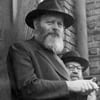In the spring of 1967 the armies of Syria, Jordan and Egypt massed on Israel’s borders, their leaders openly forecasting the annihilation of the Jewish state. On May 22nd Egypt closed the Straits of Tiran and blockaded the Israeli port of Eilat, an act of aggression tantamount to the declaration of war. “Israel,” Prime Minister Levi Eshkol declared, “is obliged to defend itself.”1
With the United States warning citizens to leave the region, the Chabad community turned to the Rebbe for guidance. In a telegram to yeshiva students in Jerusalem he wrote, “Study with diligence and dedication… certainly certainly the guardian of Israel will neither slumber nor sleep, and you will report good news.” The Rebbe dispatched a similar telegram to the residents of Kfar Chabad. Both were widely publicized in the Israeli press.2
May 28th coincided with Lag B'omer, traditionally celebrated with dancing, bonfires and field trips. In Israel the grim situation tempered festivities. “Your brothers and sisters in the land of Israel, are in a situation where G‑d protects them and sends them blessing and deliverance.” “Children Light Bonfires, Adults Donate Blood” one headline reported.3
At Chabad headquarters in New York thousands of children paraded to celebrate the holiday. “Your brothers and sisters in the land of Israel,” the Rebbe told the assembled crowd, “are in a situation where G‑d protects them and sends them blessing and deliverance.” With ringing confidence he proclaimed that the Jews in the Holy Land “will come out of the present situation successfully.” But “upon you and upon us,” he urgently enjoined the children, “rests the special obligation and merit of helping them.”
The Rebbe expressed firm conviction that when a Jewish child in America “will study another Torah verse, fulfil another mitzvah... allowing no opportunity to slip by,” and influence others to do likewise, “this rescues every Jew, wherever they may be, from the difficulties that they meet, bringing them G‑d’s blessings in increased measure… Then the Torah’s promise will be fulfilled… The Jewish people will dwell in the Land of Israel securely, and there will be peace…”4
Within two weeks the Israeli Defense Forces had swept to victory, taking control of the Sinai Peninsula, the Golan Heights and the West Bank of the Jordan river, including the Old City of Jerusalem and the Western Wall. The Rebbe hailed their success as a miracle wrought by G‑d for his people. G‑d and his people, he emphasized, are bound together essentially. But their bond is made manifest through the study of Torah and the practice of mitzvot.5
The Rebbe never argued that Torah could be a substitute for military defense. His chassidim served in the Israeli Defense Forces, and some were killed in battle.6The success of military defense depends on the moral and spiritual vitality that Torah learning and mitzva observance engender. Those who actually risked their lives to protect their fellow Jews, the Rebbe said, were greater than those who made a spiritual contribution through Torah study.7 Nevertheless, so long as they were not needed at the front he encouraged Yeshiva students to continue their studies. Their learning, he said, “guards and protects our Holy Land and those who dwell upon it.”8
In the Rebbe’s view, the success of military defense depends on the moral and spiritual vitality that Torah learning and mitzva observance engender. It was in this spirit that he initiated a campaign to encourage as many Jews as possible, especially soldiers, to perform the mitzvah of tefillin.9 The verse “all the nations of the world shall see that the name of G‑d is upon you, and they will fear you,”10 he often repeated “refers to tefillin.”11
At the heart of the Rebbe’s attitude towards the People and the Land of Israel was his conviction that the integrity of the Torah, the people and the land, are intertwined.12 He lobbied successive Israeli governments to make the halachic definition of a Jew binding by state law and so preserve the integrity of the people. If the halachic standard did not receive legal backing divisive definitions of Jewish peoplehood would proliferate.13
Similarly, he argued, compromising the integrity of the land also compromises the integrity of the Torah and the Jewish people. It is by Torah’s authority that the land belongs to the Jewish people, and it is only there that all the laws of the Torah can be fulfilled.14 Moreover, ceding territory displays weakness in the face of aggression, paving the way for further threats and putting Jewish lives at risk.15
Herein too lies the Rebbe’s point of departure from secular Zionist ideology. Historically, Only by working with Jews of all stripes, to further their common causes, could integrity be preserved.Chabad leaders always supported the Jewish community in the Holy Land, both spiritually and materially. But they opposed Political Zionism because it drove a wedge between nationalism and faith. This was a threat to the integrity of Torah, and without Torah’s guidance the integrity of the Jewish People and the Holy Land would also be compromised.16
The Rebbe never allowed such ideological differences to become catalysts for alienation. Israeli leaders, including David ben Gurion, Zalman Shazar, Menachem Begin, Ariel Sharon, Shimon Peres and Binyamin Netanyahu regularly consulted with him, and attested to his incisive knowledge of diplomatic, military and social affairs. Only by working with Jews of all stripes, to further their common causes, could integrity be preserved.17







Start a Discussion